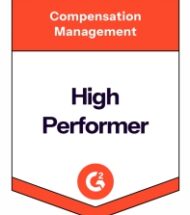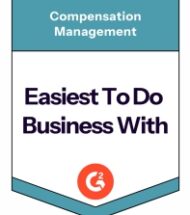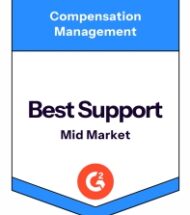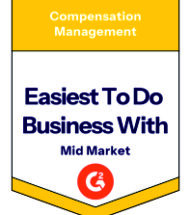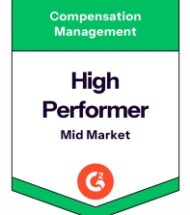Host: Welcome everyone to another exciting episode of ExtraMile by WisdomPlexus, where we chat with business leaders and industry leaders about their journeys, latest trends and how technology is shaping the future. I am your host, Sayali, and I am thrilled to welcome Haris Ikram, Co-Founder and CEO of CandorIQ. CandorIQ is an end-to-end compensation management platform helping people leaders hire and retain top talent, optimize headcount budgets and align on a unified pay philosophy.
In today's conversation, we'll explore Haris's journey, dive into CandorIQ's story and talk about how AI-powered compensation and workforce planning are reshaping the future of HR tech. Haris, it's such a pleasure to have you with us.
Welcome to the show!
Haris: Thanks for having me.
Host: So, Haris, you've led product management at unicorns like Salesforce, Blend, Checkr, etc. and that's huge. How did these experiences shape the foundation for CandorIQ?
Haris: Yeah, at many of these companies, I let, you know, I was running product teams, engineering teams, design teams and had orgs of 100 plus people in some cases and so my job, part of my job was hiring and retaining the best talent and doing it in the confines of budget as well and I ended up spending a lot of time in spreadsheets, whether it was, you know, figuring out a new offer for a candidate or it's an employee's asking for career progression or more money and figuring those things out.
Compensation data is in one place, financial data is in the other place, business KPIs are in the third place and I just built my own custom models that every single time and, you know, one of my realizations was that people are the number one asset but they're also the number one line item on the balance sheet and there's no way to strategically manage the single biggest expense that companies have and it's certainly not like payrolls and org charts and these other systems. So, my own pain points multiple times over was the genesis for CandorIQ.
Host: Thank you so much for sharing that with us. Now, let's go a little bit deeper. What challenges do people leaders face today when it comes to budgeting and compensation and how does CandorIQ help solve them?
Haris: Yeah, I mean, there's a few different things. One, this is not a single player problem, it's a multiplayer problem, right? It's the manager, it's the finance team, it's the HR team, it's other executives and you need to be able to collaborate across all these different people to make these decisions.
It's not a singular decision. Number two, it also requires a lot of different input, right? So, if you're giving someone a promotion or you're giving a merit adjustment, you have to think about what's my budget, what's their performance, how long have they been in the company, what's fair, what's aligned to business goals.
So, you have to triangulate so much information. Those are just some examples to really holistically make those decisions and I think that's a challenge as well.
Host: Moving ahead, how does having one unified platform help companies manage compensation, headcount planning and employee retention in a very balanced way?
Haris: Yeah, I think the key is there the balance, right? You want to be transparent with your employees, you want to be fair with your employees, you also want to align your employees to the business goals and objectives because if business succeeds, everyone succeeds, right? And there's not just base compensation but sometimes there's variable and bonus and equity and other types of incentives as well.
And so, using all those levers to figure out what's right is important as well. So, it's really kind of triangulating across all of those things.
Host: Let's shift to another important piece, global benchmarking data. How does it help companies attract and retain top talent and how does CandorIQ make that possible?
Haris: Yeah, that's great. I mean, I myself am an immigrant to the US and what I'll say is over the last five years since the pandemic, the workforce has really shifted, right? There's a few macro trends.
One is remote hiring is big, global hiring is big as well and so people are not just hiring in a few cities but across the board as well. So, there's these tectonic shifts in workforce and also people are hiring full-time employees, contractors, gig workers, part-time as well. So, employment type has shifted as well.
So, there's a lot of complexity now that you're going global and companies are going global and much more quickly of finding the best talent wherever it is. You need to figure out how much to pay them, what's fair for that market versus what aligns with your company philosophy. And so, having this benchmarking data is one of the core inputs of understanding that, right?
Like if you're in San Francisco or New York, how much do you pay versus if you're in Nashville, Tennessee versus if you're in the Philippines or Columbia. So, yeah, being able to understand that is really key and the data is one of those inputs.
Host: Now, if we talk about your personal journey, you've built products from zero to one and scaled them to million users. So, how does that experience help you now in tackling compensation management challenges?
Haris: Yeah, well, yeah, great question. So, one, ultimately, we're building a B2B SaaS product that's powered by AI. So, there's many different things having built products at scale, like as you said, zero to one, but also, I've had the fortune of building products that half a billion users have been using around the world as well.
So, there's many different things you learn as a product or engineering leader that you bring forward. There's many things you learn as a manager or on team building that you bring forward as well. But just to kind of give you some explicit examples, we are building multiple different things at the same time.
It's not a small feature, but we're building what we call a compound product, many different things in one. So, being able to handle that has been a good core learning. Being able to make it really easy for the end user, but also providing enterprise-level scale configuration, it's a dance, it's a balance, and it's certainly hard, but being able to do that is something that I've learned over the years as well.
And then AI is certainly a lot newer, there's a lot big surge, but being able to change how things were done, automating a lot of those workflows, that's something I've learned over the course of two decades working in product and engineering.
Host: That's remarkable. And since you mentioned transparency earlier, how important is transparency in total rewards for both employees and candidates? And how does CandorIQ deliver on that promise?
Haris: Yeah, I mean, it's absolutely transparent and important, right? So, one, let's talk about a few different angles. So, one, there's regulation around this now.
There's regulation in the US across many different states around pay and pay transparency. There is EU-wide regulation that's rolling out next year in 2026 that requires all EU countries, like candidate pay and employee pay to be transparent, whether it's employees being able to understand where they sit in their salary range and why, to candidates understanding the same thing as well. So, one, there's regulation that's driving this as well.
But as a candidate or an employee, of course, the mission of the company matters, the work you do matters, your teammates matter. So, we shouldn't take away from those. In some ways, those are the most important thing for people for long-term happiness at organizations.
But certainly, a core part of what people also think about is their compensation and their career growth. So, that's where CandorIQ can help. We can help companies, one, figure out what the right compensation is, not just how much to pay, but what's the right incentive behaviour.
Is it for salespeople? Should it be more variable compensation, commissions? Should it be bonuses?
Do we need to give equity or other long-term incentives to retain people? So, for businesses, this is important as well, but for employees as well, because I think a base cash is great, but sometimes you have all these other levers as well that you want to think about. The last thing I'll say is, so one, CandorIQ helps you figure out how much to pay across these different pay types and different geographies.
Number two, it helps you see as a manager or executive, are you paying the right amount? Is it tied to the business goals and objectives? Is it fair for the employee?
Number three, we will also expose this information back out to candidates and employees. So, a candidate can come in and see what their total package looks like, what it might look like over the course of three or four years, what it looks like if the company is growing. So, it helps them really see that.
The other thing it helps them see, I'll call out, are benefits. So, sometimes people don't pay attention to intangibles, like healthcare benefits and many other benefits as well, and appreciate that. And so, this helps surface that to candidates and employees as well, like beyond the cash and the equity, like what are other things that the company is providing that might be useful, right?
And that's particularly important, especially for Gen Z and Gen Alpha, like the relationship with work that the new generation has is different from the people who grew up in the 80s and 90s, right? Maybe people like more flexible work where they can travel, and maybe they're sitting in Bali or Mexico City or wherever it might be. So, it's not just purely about the dollars, but it's about some of those perks, benefits as well.
And so, being able to provide the right set of benefits and articulate that is, I think, also very important.
Host: Absolutely. Now, moving on to AI. AI is literally everywhere right now.
How does CandorIQ's AI-powered agent surfaces hidden insights and highlights risk to the workforce?
Haris: Yeah. So, we have several AI products. So, one, we've built a series of AI agents that can do a lot of these tasks that folks in the back office do, whether it's a compensation analyst, HR business partner, financial analyst, right?
And so, the agent can help do calculations. It can help do forecasting. It can help with predictions.
It can help in the context of workflows as well. So, let's go into each of these things. If a manager or HR person wants to come in and ask, run a gender pay gap analysis for my department or my team, that takes hours or days to do for a human.
The agent can do it in a matter of seconds. If you have a budget of a million dollars and you're thinking about whether I should hire in San Francisco, New York or London or Bangalore or Manila, you can ask the AI agent, this is my budget and this is what I want to do. What are my options?
And based on the countries you operate in, it can build that different model and say, you'll be able to hire this many people. This is what it's going to look like. That's an example of forecasting and predictions as well, like scenario mod planning.
You can ask the agent which employee is a churn risk and why are they a churn risk? Do we see any retention issues? And it's going to look at a dozen different factors and flag those for you.
So, a lot of these questions that took days to answer and run numbers or ask people to collect information, you can do in a matter of seconds. And then the last piece of it I'll talk about is there's whole roles around being able to, like you're hiring a new role and you have a job description, being able to figure out what's the career ladder look like? What my salary ranges look like?
There's job architecture design, job ladder design. There's a whole industry out there. People do it in-house, there's consultants, there's giant organizations like Aon and Mercer and Deloitte that do this on repeat and manually each time.
And our AI agents can automate 80% of that work. And again, just to be clear, it doesn't take away the work, but it helps them automate a really validate what's right for the customer. So, focus on the strategic part of that, focus on communication, aligning, buy-in, relationship management, all the things that humans are particularly good at and not copying cells from row A to row B and doing that again and again and again.
Host: That's powerful. Now, let's close with a future-looking thought. What do you see as the biggest innovations in HR tech and which ones do you think will truly transform people-focused organizations?
Haris: Yeah, I mean, certainly, I think AI is the one. There are other things as well, but here, I think this is going to transform the HR department because the HR department of the past was much more tactical. Manage your people, hire, train, reorg, et cetera.
And the expectations for HR is very different in 2025. HR is a strategic function. It's a business function with the lens of people, but your CHRO, your head of people, has a seat at the table with the CFO, the COO, with the head of sales, with the CTO.
And HR needs to understand business goals. They need to understand, be able to speak that, understand that, not only, but speak it, communicate it, and build their programs based off that. And so, I think AI helps tremendously with that because, one, all this data that's locked in different systems, whether it's in your payroll or your equity management solution or your learning and development solution or your recruiting tool, you can bring it together.
You can unlock it. You can really bring out the insights. HR can finally be proactive.
They can monitor things on a continuous basis. So, they're not just stuck on the spreadsheets and the mundane tasks. They can really kind of rise to that challenge of being that business leader that the business wants them to be.
And that's, I think, transformational for this role and expectations.
Host: Thank you so much. Haris, this has been such an insightful conversation. Thank you for sharing your journey and CandorIQ’s vision.
It's clear your leadership is redefining how organizations can make smarter data-driven people decisions. Once again, thank you so much.
Haris: Yeah, thank you so much for having me.
Host: And thank you to our listeners for joining us on this episode of ExtraMile by WisdomPlexus. I'm your host, Sayali, signing off. Stay tuned for more conversations with leaders who are shaping the future of technology.
Until then, stay tuned!
Discover Our Other Informative Interview:

